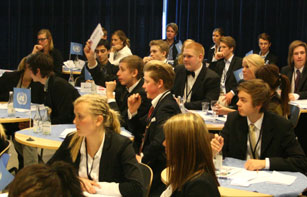A couple of weeks ago UNAIDS was approached by two students from a school in remote Sweden for information about political leadership and the AIDS response in Botswana. They were about to engage in a model UN General Assembly session together with the students at their schools. The focus was the HIV epidemic. UNAIDS invited the students, Amanda Garå and Fredrik Hellberg, to share some thoughts on their experience to find out more about how young people around the world are engaging in the response to AIDS.
By Amanda Garå and Fredrik Helleberg, students at the Hulebäck secondary school

During the negotiations in the model General Assembly, the countries have the opportunity to speak for their interests. Credit: UNAIDS/Ahlberg"
On Tuesday 23rd of November, the students of the IT-Media program at Hulebäck secondary school in Mölnlycke, Sweden, performed a model UN General Assembly session disucssing the AIDS epidemic. The whole day was a role play, where students acted as delegates from different United Nations member states. Before the big day we prepared ourselves, learning about the HIV epidemic, our respective adopted countries and international cooperation. As an example, we were visited by a person living with HIV, who spoke about his experience.
“We are trying to find ways to educate our young people not only about international relations but also about burning issues like the HIV pandemic,” says Maria Sjölund, teacher at the school.
During the day we held a meeting of the ”General Assembly”, which took place in the lobby of the school. We also had a press conference and a banquet in the evening. The students were divided into groups of two and acted as delegates from the country they had been assigned to represent. We acted as the honourable delegates of Botswana.
We are trying to find ways to educate our young people not only about international relations but also about burning issues like the HIV pandemic
Maria Sjölund, teacher at Hulebäcksgymnasiet
In total, there were 28 countries represented by 57 participants. The meeting was led by a chairman and some younger students from our school acted as journalists and photographers of the world press. The meeting was also open to spectators.
During the day several resolutions were approved, for example regarding education about HIV in primary schools. Another resolution that was written by Botswana, India and Nigeria, dealt with the production of a vaccine against HIV which received a unanimous yes-vote. One resolution which was not approved was about proposing circumcision for men as an HIV prevention method. Many countries found this proposal very devastating for their culture and also that this was a matter for every family to decide. The delegates of the model session could, like in the real UN, get up on the podium and speak for or against any proposal.
“It felt like it was a real meeting and it was very educational. I got a clearer picture about the HIV epidemic. It was a bit nervous when the opening ceremony started and every country was going to give a speech in English. After that, it was a lot of fun,” says Victor Fridh, a student at Hulebäcksgymnasiet who participated in the session.
During these three weeks, we have not just learned about the UN, but also about the HIV epidemic and the response. We felt that it was a much better way to learn about the UN and the General Assembly than just reading about how it works in school books. We really recommend other schools all over the world to host model UN General Assembly sessions because we think it could make a difference. Partly because you will learn about the subject, in this case HIV. Also partly because you will learn about how big decisions are made and that countries do not always agree, even if the proposal can look great to someone from the outside.
It felt like it was a real meeting and it was very educational. I got a clearer picture about the HIV epidemic. It was a bit nervous when the opening ceremony started and every country was going to give a speech in English. After that, it was a lot of fun
Victor Fridh, student at Hulebäcksgymnasiet
Before the role play, many students had preconceived ideas about AIDS and people living with HIV. Many students changed their minds. They felt it was interesting to realize that it is not only the poorest countries which are the worst affected. Before the lecturer visited us many were a little afraid of just being in the presence of an HIV-positive person, because we didn’t know much about it. Now that we understand more about the topic and how stigma and discrimination work we feel that these types of interactions where people can talk and learn can help break the silence around HIV.



